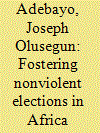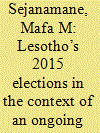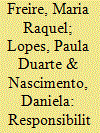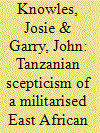|
|
|
Sort Order |
|
|
|
Items / Page
|
|
|
|
|
|
|
| Srl | Item |
| 1 |
ID:
146922


|
|
|
|
|
| Summary/Abstract |
Given that most Africans view political aspirants in terms of their ethnic and religious lineage rather than political ideology, and since most Africans rely on the media for information, there is a tendency to fall prey to biased and insensitive reportage, capable of inciting violence elicited by the prejudiced information often presented as news, features, commentaries, documentaries, etc. This article hypothesises that with appropriate training on conflict-sensitive reportage, journalists can foster peaceful and nonviolent elections through their reportage. The article recommends the adoption of an alternative method of news reportage using the peace-journalism model. The model, developed by Jake Lynch and Annabel McGoldrick, encourages journalists to report social issues in ways that create opportunities for a society to consider and value nonviolent responses toward conflict by using the insights from conflict analysis and transformation to update concepts of balance, fairness and accuracy in reporting. It also provides a new route map that traces the connections between journalists, their sources, the stories they cover and the consequences of their reportage. In addition, it builds awareness of nonviolence and brings creativity into the practical job of everyday editing and reporting. This article holds theoretical significance in that it explicitly identifies conditions that encourage journalists to apply conflict sensitivity to their reportage, thereby promoting societal peace, particularly during elections.
|
|
|
|
|
|
|
|
|
|
|
|
|
|
|
|
| 2 |
ID:
146921


|
|
|
|
|
| Summary/Abstract |
After inconclusive elections in 2012, Lesotho had a coalition government for the first time, made up of three political parties that had a narrow majority in parliament. The new government, however, faced several challenges, some of which were of its own making. The agreement among the three parties was to literally divide the government into three parts, leading to a continuous stalemate in its operation; the most serious consequence was the prorogation of parliament and the resultant attempted coup. The flight of the prime minister to South Africa and his return under a Southern African Development Community (SADC) security detail provided a short-term solution to Lesotho's security crisis. Under Cyril Ramaphosa's mediation, the prorogued parliament was conditionally opened and the election date set for 28 February 2015. However, the security dilemma – whereby the prime minister, who is also minister of defence, has no control over the military – remains. When elections are held, there does not seem to be a guarantee that they will be held in peace; moreover, there are now fears that the losers will not accept the results of the elections because of the security vacuum in Lesotho. This article argues that peace can only be salvaged by enhanced SADC security before, during and after the elections. It argues that the SADC mission should remain beyond the elections to oversee the constitutional changes that are necessary for ensuring long-term stability. On their own, Lesotho politicians are unlikely to be able to work together in order to move the country forward.
|
|
|
|
|
|
|
|
|
|
|
|
|
|
|
|
| 3 |
ID:
146918


|
|
|
|
|
| Summary/Abstract |
As empathetic as distant nations may feel about an ongoing or looming catastrophe in a particular region of Africa, they are too far removed from the horror to grasp its gravity and impact. Geographical proximity to the atrocity, and the likelihood of its spreading to their neighbourhoods, make the communities and neighbouring countries in the imploding region the best and most effective first responders to a crisis in their own backyard. A response from ‘communal’ or ‘regional’ groups is, therefore, the most practical measure for preventing human rights violations in Africa from descending into an actual genocide or an intractable genocidal condition. A community approach to preventing genocide and other human rights abuses should serve as the foundation for a new concept of ‘moral pan-Africanism’ on the African continent in the 21st century. This article makes an argument for this genocide prevention model and new moral concept.
|
|
|
|
|
|
|
|
|
|
|
|
|
|
|
|
| 4 |
ID:
146920


|
|
|
|
|
| Summary/Abstract |
The political upheavals that erupted in Kenya after the release of the 2007–8 election results resulted in the death of approximately 1 200 people, as well as the loss of livestock and other valuable property. While the Kenyan government tried to seek solutions to the crisis, the International Criminal Court (ICC) issued warrants for the arrest of top government officials. For its part, the African Union (AU) accused the ICC of racism by targeting only African leaders, and maintained that such practices undermine the rule of equality before the law set forth in Article 27 of the Rome Statute. The AU is therefore advising African countries, including Kenya, to consider withdrawing from the ICC. Will the ICC's intervention into the situation in Kenya bring justice and peace to the country, or will it add to the existing injuries affecting not just the country but the region as well? Through a critical analysis of contemporary scholarly discourse, this article unravels the dilemma of the ICC's intervention and the likely consequences of this action for the people of Kenya and Africa.
|
|
|
|
|
|
|
|
|
|
|
|
|
|
|
|
| 5 |
ID:
146917


|
|
|
|
|
| Summary/Abstract |
Despite its many institutional and political weaknesses and limitations, the African Union (AU) has been developing a variety of tools and mechanisms to respond effectively to complex disasters and emergencies (both natural and manmade) by building up a comprehensive regional security architecture. Furthermore, it has become the first and only regional or international organisation to enshrine the principle of ‘responsibility to protect’ (R2P) in its Constitutive Act. This regional approach to and formal endorsement of the R2P principle allowed it to assume a particular place in the promotion of peace and security in its area. This article aims to critically assess the effectiveness of the AU on the African continent by exploring its real capacity in preventing and responding to emergencies and violent conflicts, and therefore in rendering the principle of R2P operational. The article argues that the formalisation of principles does not necessarily mean their effective implementation. The organisation's use of the R2P principle is also greatly conditioned by internal and external factors.
|
|
|
|
|
|
|
|
|
|
|
|
|
|
|
|
| 6 |
ID:
146919


|
|
|
|
|
| Summary/Abstract |
Attitudes towards a regional military force are of paramount importance when exploring public support for regional integration. Until now, however, scholarly research has not considered the influence of attitudes towards a regional military mechanism in the sub-Saharan African context. Using Afrobarometer data, we demonstrate that military concerns are vital when exploring Tanzanian attitudes towards the proposed political federation of the East African Community (EAC), the East African Federation (EAF). More specifically, opposition to military cooperation strongly influences Tanzanian scepticism of the EAF. This finding is highly relevant given that referendums in the participating member states must be passed to facilitate political integration. Heightened opposition towards military cooperation raises the possibility of the public rejecting a politically integrated EAC. This poses a potential obstacle to the implementation of joint security policies and crucial mechanisms to provide a more stable region at large. We account for alternative explanations of Tanzanian opinion formation and reflect on the strength of military-orientated concerns for investigating public support for the East African project specifically and regional integration in sub-Saharan Africa more widely.
|
|
|
|
|
|
|
|
|
|
|
|
|
|
|
|
|
|
|
|
|